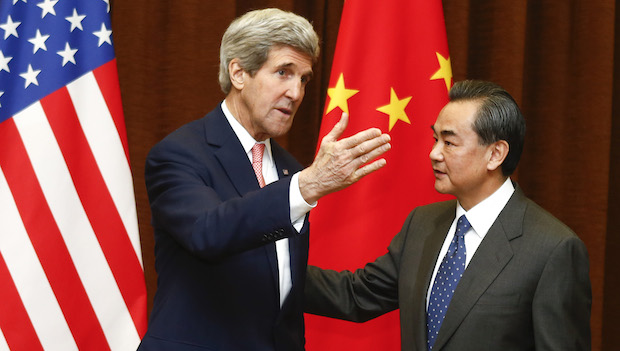
Chinese Foreign Minister Wang Yi (R) greets visiting US Secretary of State John Kerry before their meeting at the Ministry of Foreign Affairs in Beijing, China, on February 14, 2014. (Diego Azubel/EPA POOL)
Beijing, AP—US Secretary of State John Kerry ended meetings with Chinese leadership Friday with a “profound sense of optimism,” saying the two countries see eye-to-eye on need for further pressure on North Korea’s nuclear ambitions.
The Chinese “are committed to doing their part to make it happen that they also will not allow instability and war to break out in the region,” Kerry told reporters in Beijing after meeting Chinese President Xi Jinping, Foreign Minister Wang Yi and State Councilor Yang Jiechi. Still, the two sides didn’t reach consensus on managing China’s growing assertiveness that has roiled ties with neighbors.
Kerry arrived in Beijing from Seoul on the second stop of a three-nation Asian swing aimed at reassuring allies of a continued US commitment to the region. This visit is his second to China since he became the top US diplomat last year.
“China could not have been more emphatic or made it more clear that they will not allow a nuclear program [in North Korea] over the long run,” Kerry said, adding that the nations exchanged ideas on additional steps to pressure the North to comply with previous agreements to give up its nuclear weapons.
While China saw need for cooperation on North Korea, the United States and its allies failed to secure Chinese guarantees to stop making unilateral claims in maritime disputes, particularly in the South China Sea.
“I reiterated that today and hopefully whatever follows in the future will be done in an open and transparent accountable way that is inclusive about those that may or may not be concerned,” Kerry said.
Chinese Foreign Minister Wang called on the US to respect its sovereignty in Asia and elsewhere, while agreeing to some degree on the need to legally settle the territorial dispute, the official Xinhua News Agency reported.
China is “ready to work with the US” in improving ties and agrees to “properly handle our differences and problems” on the principle of “non-confrontation, non-conflict,” Wang said.
“The world is always waiting to see whether China and the United States can find the common ground despite some differences,” Kerry said. “And I think it’s important to accentuate the places where we can have the greatest impact and set an example for this major-power relationship.”
Tensions on the Korean peninsula peaked last year when North Korea carried out a third nuclear weapons test in defiance of repeated international calls to halt proliferation. China presided at six-nation talks aimed at convincing North Korea to give up its nuclear program in return for aid. The negotiations haven’t taken place since 2008. The six parties are North and South Korea, the US, China, Russia and Japan.
China is North Korea’s biggest trading partner, supplying most of the North’s refined fuel and rudimentary banking, which means it “can do more now to urge North Korea to begin taking action, to come into compliance with its international obligations,” Kerry said in Seoul Thursday.
“We believe the process of DPRK denuclearization should be achieved under the framework of the six party talks,” China’s foreign ministry spokeswoman Hua Chunying said Friday in response to Kerry’s remarks, referring to the North by its official name, the Democratic People’s Republic of Korea. “We should do more to relax tension on the peninsula and create favorable conditions for resumption of six-party talks.”
Relations between North and South Korea showed signs of improvement this year after they agreed to revive reunions of families separated by the 1950–1953 Korean War, which technically continues because it ended without a peace treaty. The two sides held talks today in the demilitarized zone for the second time this week and agreed to continue dialog.
Kerry’s visit to the region coincided with a White House announcement of President Barack Obama’s own trip to Asia in April, to include stops in both Japan and South Korea—two US allies feuding over territorial and historical disputes.
It is critical to maintain a “robust trilateral cooperation, particularly in the face of North Korea’s nuclear threat,” Kerry said Thursday.
In Beijing, Kerry also reinforced the US position that it’s unwise for China to take actions that disrupt the regional status quo. In addition to territorial claims in the East China Sea, China is embroiled in disputes with several Southeast Asian nations over a large part of the South China Sea, through which some of the world’s busiest shipping lanes run.
China in November set up an air defense identification zone in the East China Sea over islands disputed with Japan, demanding that civil and military aircraft present flight plans before entering the space. The US and Japan have continued to run flights through the area without consulting China.
The US has also backed Japanese Prime Minister Shinzo Abe’s push to reinterpret the country’s postwar pacifist constitution to allow Japan’s defense forces to come to the aid of allies. The move has rankled China and South Korea, which suffered under Japanese occupation through World War II.
The US must be “responsible and unbiased” without any “one-sided appeasement,” if it truly wants to play a constructive role in the region, Xinhua said in a separate editorial Friday.
